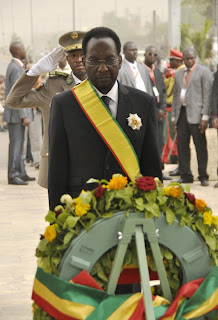Dioncounda Traoré (born 23 February 1942) is a Malian politician who has been President of Mali in an interim capacity since April 2012. He has been President of the National Assembly of Mali since September 2007, as well as President of the Alliance for Democracy in Mali-African Party for Solidarity and Justice (ADEMA-PASJ) since 2000. He was also President of the Alliance for Democracy and Progress (ADP), an alliance of parties that supported the re-election of President Amadou Toumani Touré in 2007.
Political Career
Traoré was born in Kati. After studying abroad in the Soviet Union, at the University of Algiers, and at the University of Nice, he taught in Mali at the Teachers' College (ENSUP) from 1977 to 1980. He was then arrested for trade union activities and sent to Ménaka in northern Mali. Subsequently, he became director-general of the National School of Engineering. He participated in the struggle for democracy that culminated with the overthrow of President Moussa Traoré in March 1991. He was a founding member of ADEMA, and at its constitutive congress, held on 25–26 May 1991, he was elected as its Second Vice-President, while Alpha Oumar Konaré was elected as the party's President and Mohamed Lamine Traoré was elected as its First Vice-President.
After Konaré was elected as President of Mali in the 1992 presidential election, Traoré was appointed Minister of the Civil Service, Labor, and the Moderization of Administration on 9 June 1992, in the first government under Konaré's presidency. He was then named Minister of State for Defense on 16 April 1993, holding that position until he became Minister of State for Foreign Affairs on 25 October 1994. At ADEMA's first ordinary congress, held in September 1994, Traoré was elected as the First Vice-President of the party, while Ibrahim Boubacar Keïta was elected as its President.
He was elected as a Deputy in the National Assembly from Nara in 1997 and resigned as Minister of State for Foreign Affairs on 24 August 1997 to take his seat. In the National Assembly, he became President of the ADEMA Parliamentary Group, and following the resignation of Keïta as ADEMA President in October 2000, Traoré was elected as ADEMA President at the party's first extraordinary congress, held on 25–28 November 2000. In the 2002 parliamentary election, he was defeated in Nara and lost his seat.
In the July 2007 parliamentary election, Traoré ran again at the head of an ADEMA list in Nara, where three seats were at stake. In the first round, his list won 39.59% of the vote, and in the second round it prevailed with 58.41% of the vote. When the new National Assembly held its first meeting on 3 September 2007, Traoré was elected as President of the National Assembly, receiving 111 votes against 31 for Mountaga Tall of the National Congress for Democratic Initiative (CNID), another member of the ADP.
Following the March 2012 military coup, which precipitated economic sanctions and a blockade by ECOWAS against Mali, a deal, brokered in Burkina Faso by President Blaise Compaoré under the auspices of ECOWAS, was signed on 6 April 2012 that would see the head of the military junta, Captain Amadou Sanogo, cede power to Dioncounda Traoré to assume the presidency in an interim capacity until an election could be held. Traoré had left the country following the coup, but returned on 7 April.
From : www.wikipedia.org
